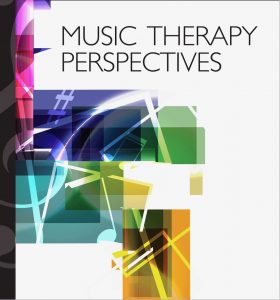Moving Forward with MTP
 Music Therapy Perspectives, AMTA’s peer reviewed journal speaking to clinical practice, was launched in the 1980’s and is moving forward at a dizzying pace. In this AMTA-Pro podcast, MTP’s incoming Editor-in-Chief, Dr. Laura Beer along with Associate Editors Dr. Jennifer Jones and Dr. Noah Potvin discuss AMTA’s partnership with Oxford University Press, highlighting a variety of avenues for music therapists and the broader audience to access the content of MTP in new and unique ways. The editorial team encourages clinicians, researchers, and even students to write and submit articles. The MTP Mentorship service is available to help MT-BCs craft the beginning of an idea into an article to share with other clinicians. MTP’s new Clinical Portraits section provides a forum for articles about exploratory research, emerging treatment practices and protocols, unique client populations, and new strategies for teaching or supervising students and interns. Listeners of this AMTA-Pro podcast also learn about a variety of online platforms – Facebook, Twitter, Instagram, YouTube blogs, and virtual issues – designed to increase dissemination of MTP content, encourage interaction with researchers and clinicians, and, ultimately, further the practice of music therapy.
Music Therapy Perspectives, AMTA’s peer reviewed journal speaking to clinical practice, was launched in the 1980’s and is moving forward at a dizzying pace. In this AMTA-Pro podcast, MTP’s incoming Editor-in-Chief, Dr. Laura Beer along with Associate Editors Dr. Jennifer Jones and Dr. Noah Potvin discuss AMTA’s partnership with Oxford University Press, highlighting a variety of avenues for music therapists and the broader audience to access the content of MTP in new and unique ways. The editorial team encourages clinicians, researchers, and even students to write and submit articles. The MTP Mentorship service is available to help MT-BCs craft the beginning of an idea into an article to share with other clinicians. MTP’s new Clinical Portraits section provides a forum for articles about exploratory research, emerging treatment practices and protocols, unique client populations, and new strategies for teaching or supervising students and interns. Listeners of this AMTA-Pro podcast also learn about a variety of online platforms – Facebook, Twitter, Instagram, YouTube blogs, and virtual issues – designed to increase dissemination of MTP content, encourage interaction with researchers and clinicians, and, ultimately, further the practice of music therapy.
[display_podcast]
Moving Forward with MTP
Laura Beer, Jennifer D. Jones, Noah Potvin
February, 2018
— + —
 Music Therapy Perspectives (MTP), an official publication of the American Music Therapy Association, seeks to promote the quality of music therapy clinical practice through the dissemination of scholarly work, including clinically-focused research, articles about innovative developments and new trends, case studies, and theoretical articles. The peer-reviewed journal focuses on clinical benefits of music therapy, and it serves as a resource and forum for music therapy clinicians and educators, music therapy students, and those in related professions.
Music Therapy Perspectives (MTP), an official publication of the American Music Therapy Association, seeks to promote the quality of music therapy clinical practice through the dissemination of scholarly work, including clinically-focused research, articles about innovative developments and new trends, case studies, and theoretical articles. The peer-reviewed journal focuses on clinical benefits of music therapy, and it serves as a resource and forum for music therapy clinicians and educators, music therapy students, and those in related professions.
Resources with valuable information about writing for MTP are found below. Podcast listeners will want to read more about MTP services and innovations in an editorial in the October 2017 issue of the Music Therapy Perspectives written by incoming Editor-in-Chief Dr. Laura Beer and Associate Editor Dr. Jennifer Jones.
Listeners of this AMTA-Pro podcast hear details about the presence of Music Therapy Perspectives on a variety of online platforms and virtual issues. Associate MTP Editor Dr. Noah Potavin is developing and expanding these forward-thinking, consumer-reponsive, interactive forums and services currently found @AMTAResearch on Facebook, Twitter, and Instagram. The purpose of these interactive AMTA Music Therapy Research pages is to increase dissemination of MTP content, to encourage interaction between researchers and clinicians, and, ultimately, to further the practice of music therapy by sharing contemporary developments in music therapy research, scholarship, and clinical practice. Emphasis is placed on articles published by AMTA’s two peer-reviewed journals – the Journal of Music Therapy and Music Therapy Perspectives.
Music therapy professionals, interns, and students are encouraged to contact the editorial team of Music Therapy Perspectives (MTP) with any questions, comments, or ideas about this innovative peer-reviewed clinical journal of AMTA.
AMTA-Pro Podcast Speakers
 Laura Beer, Ph.D., MT-BC, has extensive clinical experience as a music therapist, having trained with Clive and Carol Robbins at the Nordoff-Robbins Music Therapy Center in New York City and worked as a clinician in a wide range of settings. Her most recent clinical experience is as a music therapist in the neonatal intensive care unit (NICU). As a hospice music therapist she received national recognition for her work. Laura is incoming Editor-in-Chief of Music Therapy Perspectives as well as an internationally acclaimed speaker, having presented at the 2017 World Congress of Music Therapy in Tsukuba, Japan as well as the national conference for the American Association of Music Therapy. Laura’s primary research interests center on multicultural issues in music therapy education as well as arts-based methodologies. Contact Dr. Beer via email with ideas, comments, questions related to the Music Therapy Perspectives: [email protected]
Laura Beer, Ph.D., MT-BC, has extensive clinical experience as a music therapist, having trained with Clive and Carol Robbins at the Nordoff-Robbins Music Therapy Center in New York City and worked as a clinician in a wide range of settings. Her most recent clinical experience is as a music therapist in the neonatal intensive care unit (NICU). As a hospice music therapist she received national recognition for her work. Laura is incoming Editor-in-Chief of Music Therapy Perspectives as well as an internationally acclaimed speaker, having presented at the 2017 World Congress of Music Therapy in Tsukuba, Japan as well as the national conference for the American Association of Music Therapy. Laura’s primary research interests center on multicultural issues in music therapy education as well as arts-based methodologies. Contact Dr. Beer via email with ideas, comments, questions related to the Music Therapy Perspectives: [email protected]
Jennifer D. Jones, Ph.D., MT-BC, is an associate professor and the director of the music therapy program at Western Illinois University .  She has expertise in music therapy in early childhood and adults with developmental disabilities, music therapy in mental health, and has been teaching music therapy courses for more than 15 years. Jennifer has published on multiple topics including songwriting, the development of clinical skills in students, research methodology, and professional practices of music therapists. She has presented both nationally and regionally for organizations such as the American Music Therapy Association (AMTA) and the Great Lakes Region of AMTA. She has been active in service with previous executive board position with SER and GLR and current service as an Assembly Delegate. Jennifer presently serves as the Associate Editor-Manuscripts for Music Therapy Perspectives.
She has expertise in music therapy in early childhood and adults with developmental disabilities, music therapy in mental health, and has been teaching music therapy courses for more than 15 years. Jennifer has published on multiple topics including songwriting, the development of clinical skills in students, research methodology, and professional practices of music therapists. She has presented both nationally and regionally for organizations such as the American Music Therapy Association (AMTA) and the Great Lakes Region of AMTA. She has been active in service with previous executive board position with SER and GLR and current service as an Assembly Delegate. Jennifer presently serves as the Associate Editor-Manuscripts for Music Therapy Perspectives.
Noah Potvin, Ph.D., MT-BC, is an assistant professor of music therapy at Duquesne University with a joint appointment in the Mary Pappert School of Music and the School of Nursing. Noah has expertise in music therapy in end-of-life care  settings, and recently completed his doctoral dissertation developing a theoretical model of resource-oriented music therapy with pre-bereaved hospice caregivers. Noah has published on multiple topics related to the theoretical and clinical development of medical music therapy, including the spiritual components of hospice work, the boundaries of symptom management in oncologic care, and clinical trends in cardiac care. He has presented both nationally and regionally for organizations such as the American Music Therapy Association (AMTA), the New Jersey Tri-County Regional Ethics Committee, and the Southern Gerontological Society. In 2016, Noah was an invited speaker at Radford University’s Annual Music Therapy Symposium. Noah presently serves as the Associate Editor-Communications for Music Therapy Perspectives, and has previously served on the Certification Board for Music Therapists Exam Committee, AMTA’s Affiliate Relations Committee, and AMTA’s Assembly of Delegates. Contact Dr. Potvin about MTP online forums and virtual issues: [email protected]
settings, and recently completed his doctoral dissertation developing a theoretical model of resource-oriented music therapy with pre-bereaved hospice caregivers. Noah has published on multiple topics related to the theoretical and clinical development of medical music therapy, including the spiritual components of hospice work, the boundaries of symptom management in oncologic care, and clinical trends in cardiac care. He has presented both nationally and regionally for organizations such as the American Music Therapy Association (AMTA), the New Jersey Tri-County Regional Ethics Committee, and the Southern Gerontological Society. In 2016, Noah was an invited speaker at Radford University’s Annual Music Therapy Symposium. Noah presently serves as the Associate Editor-Communications for Music Therapy Perspectives, and has previously served on the Certification Board for Music Therapists Exam Committee, AMTA’s Affiliate Relations Committee, and AMTA’s Assembly of Delegates. Contact Dr. Potvin about MTP online forums and virtual issues: [email protected]
Resources for Writing for Music Therapy Perspectives
MTP Instructions to Authors: https://academic.oup.com/mtp/pages/General_Instructions
JMT Instructions to Authors: https://academic.oup.com/jmt/pages/General_Instructions
JMT Reporting Guidelines Resources: These links provide detailed instructions for researchers on how to design quantitative and qualitative studies with rigor.
This link has additional embedded links of guides for articles that are non-research: http://www.equator-network.org/reporting-guidelines/consort/
Reporting Guidelines
Authors submitting manuscripts with one of the designs listed below are required to use the corresponding reporting standards when preparing their manuscript:
- For music-based intervention studies, please refer to Reporting Guidelines for Music-based Interventions. Checklist available https://www.ncbi.nlm.nih.gov/pmc/articles/PMC3141224/table/T2/
- For randomized controlled trial designs, please refer to the Consolidated Standards of Reporting Trials (Consort) http://www.consort-statement.org/ Checklist available http://www.equator-network.org/reporting-guidelines/consort/
- For non-randomized designs, please refer to Transparent Reporting of Evaluations with Nonrandomized Designs (Trend at https://www.cdc.gov/trendstatement/) Checklist available https://www.cdc.gov/trendstatement/pdf/trendstatement_TREND_Checklist.pdf
- For systematic reviews, integrative reviews, and meta-analyses, please refer to Preferred Reporting Items for Systematic Reviews and Meta-Analyses (http://www.prisma-statement.org/ PRISMA ) Checklist available http://prisma-statement.org/PRISMAStatement/Checklist.aspx
- For case study designs, please refer to the Case Report Guidelines (CARE) Checklist available http://data.care-statement.org/wp-content/uploads/2016/08/CAREchecklist-English-2013-1.pdf
Authors submitting manuscripts with qualitative research designs are strongly encouraged to consider the following publications when preparing their manuscript:
- The Standards for Reporting Qualitative Research: A Synthesis of Recommendations (SRQR) http://ccet-database.oss-cn-qingdao.aliyuncs.com/EBR%2Freporting-guideline%2FSRQR%2FStandards_for_Reporting_Qualitative_Research.pdf
- For studies that use interview and/or focus groups, please refer to the Consolidated Criteria for Reporting Qualitative Research (COREQ) https://academic.oup.com/intqhc/article-lookup/doi/10.1093/intqhc/mzm042
- Stige, B., Malterud, K., & Midtgarden, T. (2009). Toward an agenda for evaluation of qualitative research. Qualitative Health Research, 19(1), 1504-1516. Also referred to as EPICURE.
Resource for Writing a Case Report:
Writing a Case Report: http://data.care-statement.org/wp-content/uploads/2017/03/Writing-a-Case-Report-20170310.pdf
Grammar Helper
Do and don’ts of article writing – https://uncw.edu/ulc/documents/Academic%20dos%20and%20donts.pdf
Recommended Books:
Bob Price (2014). Writing a journal article: guidance for novice authors. Nursing Standard, 28, 35, 40-47.
Wendy Laura Belcher (2009) Writing Your Journal Article in Twelve Weeks: A Guide to Academic Publishing Success. Sage publications.
Link to Writing Guides (APA, MLA, others):
OWL at Purdue – Writing Guidelines – https://owl.english.purdue.edu/owl/
Link to English Language Services for authors whose first language is not English:
https://academic.oup.com/journals/pages/authors/language_services